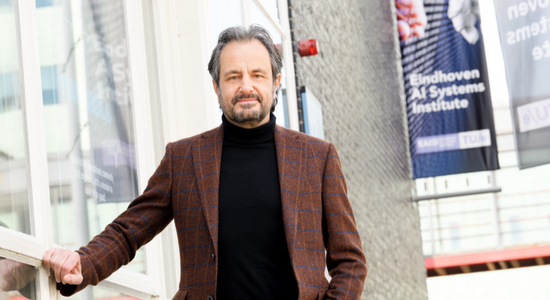Artificial intelligence will improve safety in urban mobility: Carlo van de Weijer in Mexico
- Carlo van de Weijer, Professor at the Technical University of Eindhoven, assures that electromobility is advancing rapidly in large cities; China and the United States are global leaders.
- He considers that Latin America faces the challenge of advancing towards intelligent, efficient and safe mobility but sees a lot of potential to “leap frog” towards speeding up this transition.
- The mobility specialist will give a keynote speech on artificial intelligence and the future of mobility at Intertraffic Mexico 2022, to be held from November 8 to 10 at the Citibanamex Center in Mexico City.
Mexico City, September 22, 2022.- The future of mobility in large cities will benefit from new energy and artificial intelligence technology, which will make urban transportation safer and more efficient, said Carlo van de Weijer, Professor at the Technical University of Eindhoven, in the Netherlands, and a global expert in future mobility issues
.
"Electrification will take over transportation much faster than anyone had anticipated, mainly because in 5 to 10 years, at the latest, electric driving will be cheaper than vehicles with combustion engines. Autonomous mobility will make vehicles much safer, with implicitly safe traffic, and much more comfortable. But the real added value of fully autonomous cars is increasingly in question, due to the huge technological and legal challenges, which can be solved if it were not for the lack of a real business case to justify the huge development cost required," he explained.
Carlo van de Weijer will give the keynote conference "The Influence of Artificial Intelligence in the Future of Mobility", at Intertraffic Mexico 2022, on November 8, 10.00 hrs, at the Citibanamex Center in Mexico City. The specialist assured that artificial intelligence impacts mobility in different dimensions: the most discussed is intelligence to help drivers make vehicles much safer and more comfortable, perhaps ultimately leading to autonomous vehicles; secondly, artificial intelligence can greatly improve transportation planning by aligning all search and demand data and monitoring travel behavior; a third important area is logistics, where intelligence can and should dramatically increase efficiency.
In terms of electrification, he noted that China and the United States are currently leading the way in electro mobility, especially as China's strategic position with respect to mineral resources is important.
In the case of Latin America, he noted that the outlook is positive and the region faces the challenge of moving towards smart, efficient and safe mobility. He indicated that countries in the region can refrain from investing massively in expensive infrastructure and focus on smarter vehicles, and doing so “leap frog” on new developments by skipping a few intermediate steps.
He commented that in Latin America artificial intelligence in mobility has already arrived, through vehicle-based traffic information, which is already a common good. "Many countries are leveraging that strength to use all the smart data from vehicles to improve traffic management. another example where Latin America is leading the way are the bus rapid transit systems that are well known for outperforming traditional rail systems in many ways. That is pure intelligent mobility," the specialist pointed out. A potential next step is the huge potential of new electrified two-wheelers and all kinds of micro-mobility systems.
He detailed that artificial intelligence helps make vehicles much safer and more comfortable, plus it can greatly improve transportation planning by aligning all search and demand data, and monitoring travel behavior. Another important area is logistics, where intelligence can and should dramatically increase efficiency.
To break down barriers to investment in smart mobility and projects in the region, he felt it is necessary to incentivize the purchase of smart technology and focus infrastructure on security. "In the end, implicit safety comes mainly from a combination of infrastructure design and smarter vehicles," he argued.
Intertraffic is the world's leading brand in intelligent mobility, parking, artificial intelligence and mobility, safety and road infrastructure, traffic management, which has been held for 50 years in Amsterdam and in Mexico will celebrate its sixth edition from November 8 to 10, at the Citibanamex Center in Mexico City.
More information: http://www.intertraffic.com
LinkedIn: Intertraffic Worldwide Events / Intertraffic Mexico
Twitter: @intertraffic_mx
Facebook: Intertraffic Mexico #IntertrafficMexico
About RAI Amsterdam:
Personal meetings continue to be a powerful form of communication, and exhibitions are the ideal medium for connecting worlds, people and markets. With a portfolio of top brands, including Intertraffic, RAI Amsterdam creates inspiring events that blend context, content and communities. The focus on quality and target group has made RAI Amsterdam the market leader in a significant number of sectors. Wherever in the world an event may take place, RAI Amsterdam’s focus is on generating business for exhibitors, visitors, sponsors and partners. www.rai.nl
About Tarsus Mexico:
Tarsus Mexico is the organizer with the longest trajectory in the Mexican market since 1991, presenting international quality events with trends, innovations and the global and local panorama of the industries it promotes such as PLASTIMAGEN® MEXICO, EXPO MANUFACTURA®, THE GREEN EXPO®, Intertraffic Mexico, Aquatech Mexico. Tarsus Mexico is part of tarsus Group, one of the most important organizers worldwide. Headquartered in London, Tarsus Group organizes more than 180 events Tarsus Medical, Connect Meetings, Dubai Air Show PLASTIMAGEN® MEXICO and the Labelexp World Seriesor. www.tarsus.mx, www.tarsus.com
Share your story
Do you have an innovation, research results or an other interesting topic you would like to share with the professionals in the infrastructure, traffic management, safety, smart mobility and parking industry? The Intertraffic website and social media channels are a great platform to showcase your stories!
Please contact our Sr Brand Marketing Manager Carola Jansen-Young.
Are you an Intertraffic exhibitor?
Make sure you add your latest press releases to your Company Profile in the Exhibitor Portal for free exposure.

.png?h=400&iar=0&w=1400)
.png?h=400&iar=0&w=1400)
.png?h=600&iar=0&w=1200)